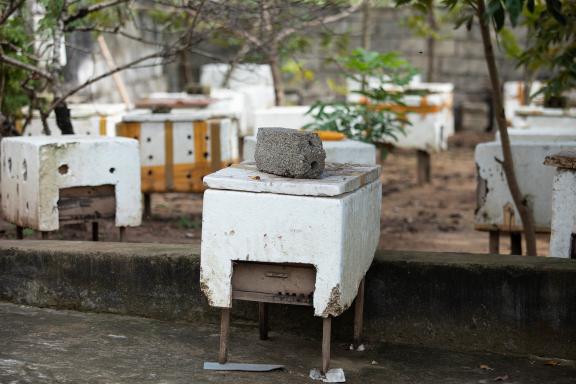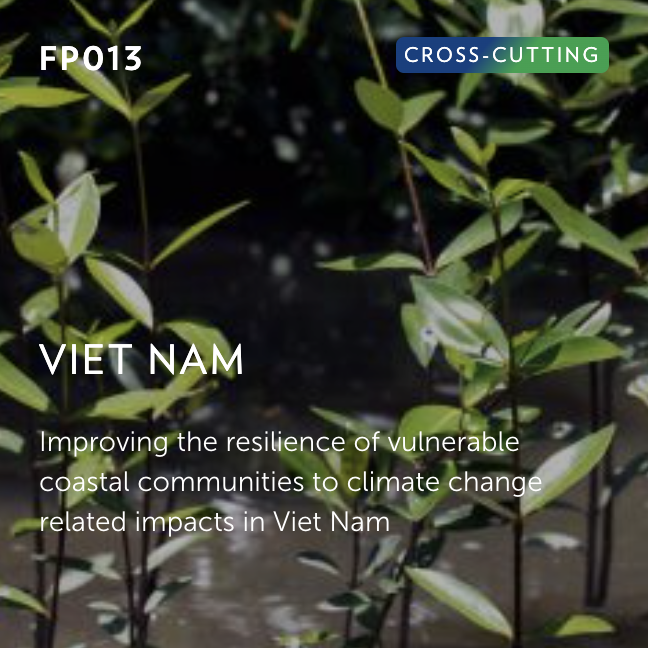Buzzing businesses: Restoring mangroves, revitalising livelihoods amid climate challenges in Viet Nam
GCF-financed project in Viet Nam helps coastal communities to “bee” more resilient through mangrove honey production
In Viet Nam, coastal communities face frequent flooding and storms. Each year, approximately 60,000 houses in coastal Viet Nam are damaged or destroyed, disrupting lives and livelihoods. According to the Global Climate Risk Index, the country was ranked 13th among the countries most exposed to climate risks. Frequent climate-induced disasters also make it harder for vulnerable families to escape the cycle of poverty.
GCF, UNDP, and the Government of Viet Nam are working together to urgently increase the resilience of vulnerable coastal communities in Viet Nam by implementing tried and tested solutions. For example, through the rehabilitation of 4,000 hectares of mangroves to serve as storm surge buffers and provide resources for coastal livelihoods.
Restored mangroves not only act as a natural barrier, but can also boost the incomes of farmers, fisherfolks, and other rural businesses – for example through beekeeping and honey production.
Partnership with nature
Bees feast on mangrove flowers, which are free from pesticides and chemicals, producing pure honey for beekeepers. The forest also flourishes with the project's regeneration efforts and enjoys the bees' pollination.
As a carbon sink and shield against floods, the mangroves in turn protect local communities. These trees also provide environments for fish, crabs, and shrimps, which local communities can sustainably harvest – adding much needed income.
Photo by UNDP Viet Nam / Vu Ngoc Dzung
Prior to GCF’s support, each beekeeping household produced an average of 3 kilograms of honey per colony, generating VND 600,000 (USD 26) in revenue and VND 400,000 (USD 17) in profit. With GCF’s support, honey production more than doubled to 7 kilograms per colony, resulting in total sales revenue of VND 1.4 million (USD 60) or VND 200,000 (USD 8.70) per kilogram.*
Beekeeping households in Da Loc commune, Thanh Hoa province are experiencing this sweet success.
Vu Tan Suu and his family cultivate mangrove honey. Initially, their honey production was limited, providing only a meagre income. Thanks to the project, Suu and his family received training on beekeeping best practices to improve their product’s quality. The support helps families like Suu’s to improve their income, not just from beekeeping but also from aquaculture and livestock.
Photo by UNDP Viet Nam / Nguyen Viet Nghi
“From the first five colonies, we have been able to increase the number of colonies to 11 so far. The quality of honey has improved significantly. Each colony can produce 7-9 kilograms of honey, and we can earn as much as VND 200,000-300,000 (USD 8.70-13) per kilogram. Our life has gradually been changing.”
Inspiring more climate action in Viet Nam’s coastal communities
As of 2021, over 4,003 hectares of mangroves were successfully replanted or regenerated, surpassing the project's 4,000 hectare-target. It has been estimated that the carbon sequestration provided by these mangroves was 1,740,218 metric tonnes of CO2 equivalent. The mangroves also reduced greenhouse gas emissions by over 190,000 metric tonnes of CO2 equivalent.
The project will plant an additional 149 hectares by 2023, further boosting efforts towards achieving Viet Nam’s national climate goals.
Photo by UNDP Viet Nam / Nguyen Viet Nghi
The project also supports the collaboration between local authorities in the Thanh Hoa province, experts, and beekeepers to enhance honey quality and income streams. This involves quality verification, registration, brand development, and expanding market opportunities with the private sector. A cooperative group has also been established for households interested in the honey business, fostering knowledge sharing and resource exchange among its members.
Beekeepers also received technical support for business development, including assistance in creating business plans and enhancing their natural honey businesses.
Photo by UNDP Viet Nam / Nguyen Viet Nghi
Mangrove restoration and livelihood support are only a part of this transformative GCF-financed initiative. Climate-resilient housing and community-based disaster risk management, vulnerability assessments, and planning processes are also being scaled up. These efforts ensure that benefits grow in the long-term – building more buzzing businesses for more resilient homes.
Words: GCF/UNDP Viet Nam (Based on UNDP story)
Photos: UNDP Viet Nam/ Nguyen Viet Nghi and Vu Ngoc Dzung
